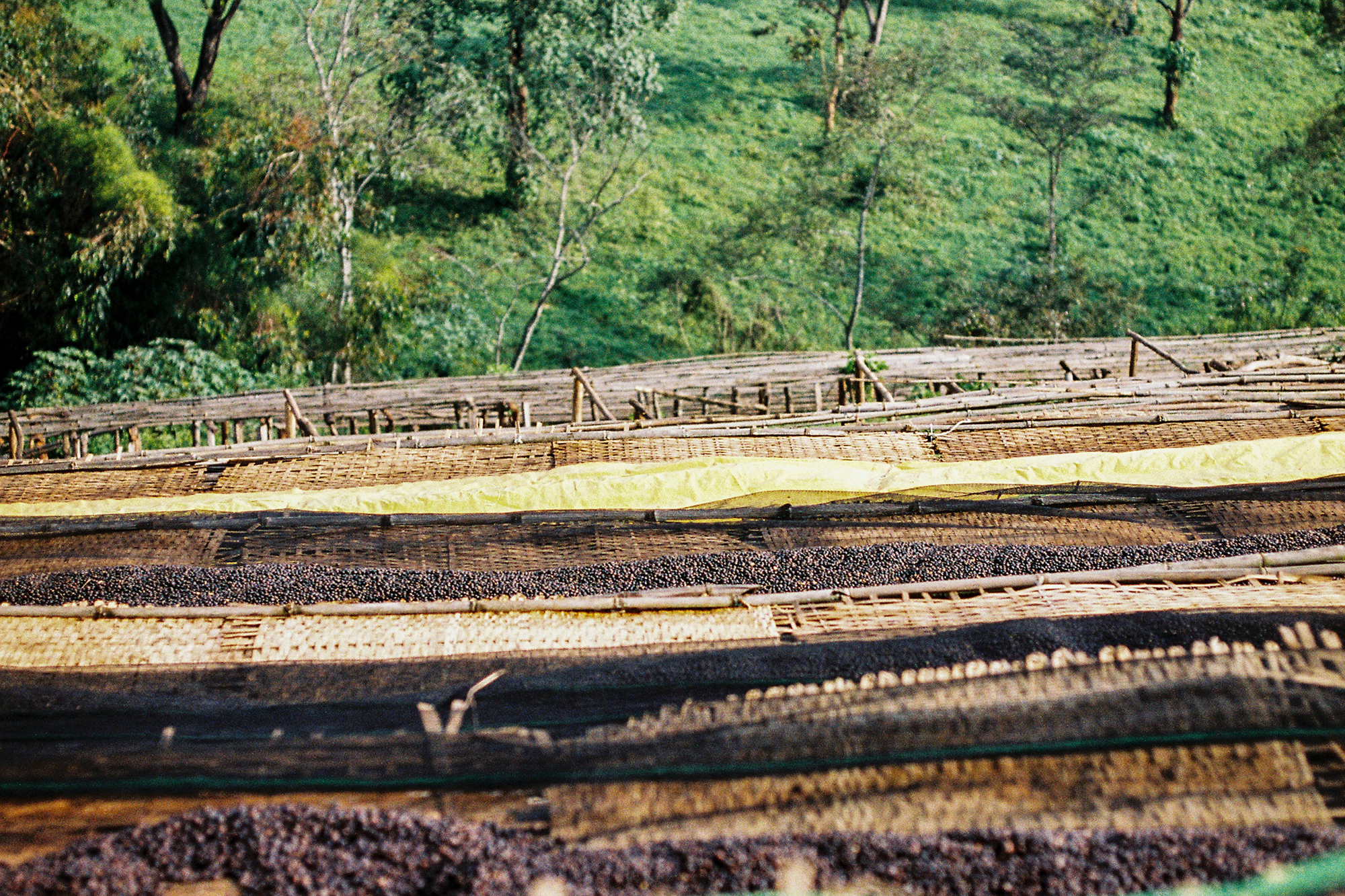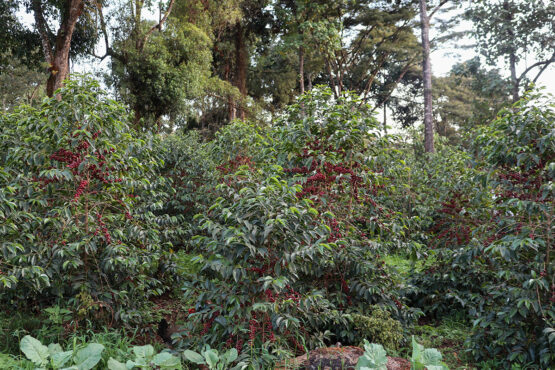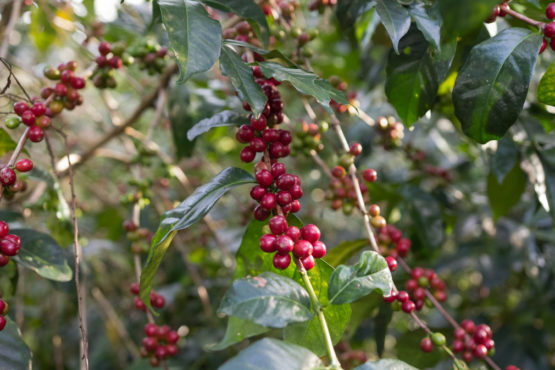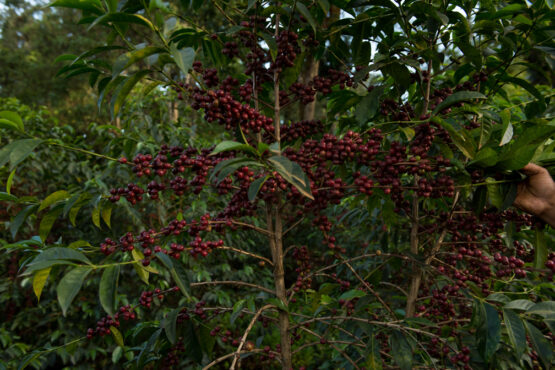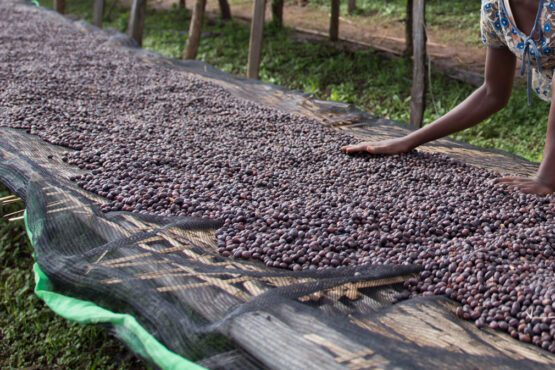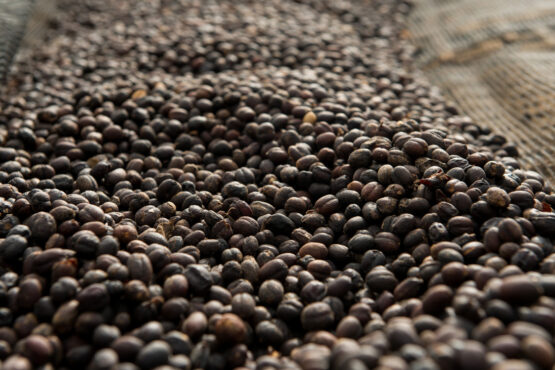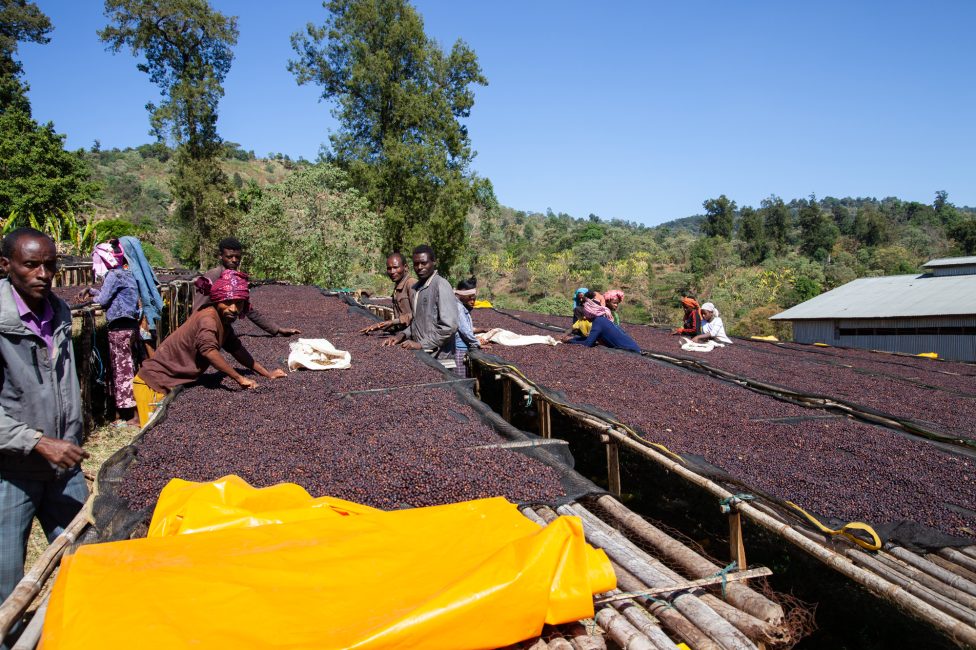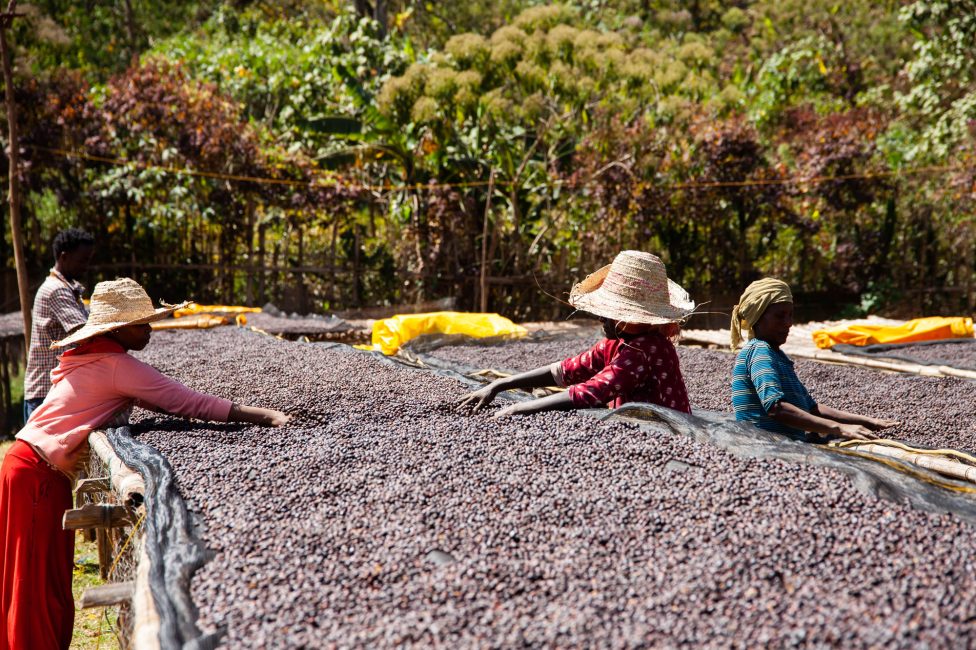Uraga Natural Anaerobic
Unique and distinct, with tropical acidity and syrupy sweetness. Melon, custard apple and pineapple, with a clean finish.
This specially-prepared anaerobic lot is made up of coffees grown in the ‘kebele’ (town or village) of Solomo, in the ‘woreda’ (administrative district) of Uraga, in Ethiopia’s Guji Zone. The coffee was processed at Uraga Washing Station, which is owned by Tracon Trading. This family-owned exporting company also manage quality control at the washing station, and prepare the resulting parchment for export at an impressive dry milling facility in Addis Ababa. Along with their specially prepared lots, Uraga produces both washed and natural coffees.
During harvest, freshly picked coffee cherry is delivered daily by some 700 local coffee growers, before being processed under the watchful eye of washing station manager, Zelalem Alemu. The majority of the families who contributed to this lot farm organically on tiny plots of land, averaging just 2.4 hectares in size. Coffee is their main cash crop and grows alongside food crops of corn, grain and bananas, under the shade of native Birbira, Wanza, and Acacia trees. The average elevation of the farms in this region is very high – around 1,900–2,100m above sea level – and this, combined region’s cool temperatures, is ideal for the slow ripening of coffee cherries, leading to denser beans and a sweeter, more complex cup profile.
ABOUT TRACON TRADING
Established by Mr. Omer Ali Shifaw in 2008, Tracon Trading PLC is a leading exporting company involved in a number of industries in Ethiopia, including construction, real estate, freight and coffee. The family-owned company own a number of coffee farms and washing stations in Ethiopia’s producing regions, along with a state-of-the-art dry mill and storage facility in Addis Ababa, where quality control is overseen by Adbuhay Hassen. Here, up to 6 tonnes of coffee are dry milled per hour, with conveyor belt assited hand-sorting and Buhler Z+ colour sorters used to further improve the quality of the coffee processed.
Tracon is committed to improving conditions for the communities surrounding their farms and washing stations. Not only are all employees paid above market rates, but farmers can access advance payments for their contributed cherry, as well as educational and training materials. The company has also constructed gravel roads to their washing stations, improving accessibility for contributing farmers and workers alike.
ABOUT THE GUJI ZONE
The Guji zone was established as a unique production area in 2002. It is located in the southern portion of the political region of Oromia and is named after the Oromo people: a tribe with a long, proud history in coffee production.
Prior to 2002, coffees from Guji were sold under the broader classification of Sidama, a huge producing region covering much of central-south Ethiopia. Today, coffees from Guji are classified separately and are recognised worldwide for their unique and distinctive cup profile. This distinctiveness is driven by the unique combination of elements in this production area, including high elevations, rich, fertile soil, and exceptional heirloom varieties. Most communities in the region still live rurally and make a living from farming, with few or no agrochemicals used on the fields. Coffee remains the major cash crop for most families in the Guji region, who grow coffee alongside food for consumption.
Guji is bordered on the south and west by Borena, on the north by Gedeo and Sidama, and on the east by Bale and the Somali Region. Coffees that are classified as ‘Gujis’, originate from the ‘woreda’ (administrative regions) of Adoola Redi, Uraga, Kercha, Bule Hora, and Shakisso, which is where this lot is from.
ABOUT THE SIDAMA COFFEE REGION
Historically, the Sidama coffee region refers to a wide geographical area encompassing much of central-south Ethiopia, that is well known for producing exceptional natural and washed coffees. The region is located in Ethiopia’s South East Coffee Zone, and includes renowned coffee-producing localities such as Yirgacheffe, Kochere, West Arsi, Bensa and Guji. After a 2019 Referendum, some of the territories within the Sidama coffee region formed an autonomous regional state. This coffee region now extends across the states of Sidama, Oromia and the Southern Nations, Nationalities, and People’s Region (SNNPR), three of eleven ethnically-based regional states of Ethiopia.
Coffees that are grown and processed in Sidama showcase an extremely diverse range of flavour profiles, and are noted for their intensely fruit-forward, tea-like, floral and complex character that is sought after worldwide. It is widely accepted that the coffee species, Arabica, originated in the lush forests of southern forests of Ethiopia and hence growing conditions in this area are perfectly suited for producing exquisite coffees.
The Sidama coffee region is named for the Sidama people, a tribe with a long and proud history of coffee production. Coffee has been here for centuries and is an important source of income for rural households, who grow it as the primary cash crop. Family plots are small and intensively farmed with intercropped coffee, food crops like pulses, grain and yams, and other cash crops like khat (similar to tobacco) and Ethiopian banana. Most farms are planted amongst or alongside indigenous forest trees, which provide a thick canopy of shade for the coffee trees. Historically, farmers in this area will use organic farming practices (although it is unlikely to be certified) as there is no ready access to artificial fertilisers or pesticides.
VARIETY
This coffee is a mix of native or “landrace” varieties and JARC varieties 74110, 74112 and 74158.
For many years, most Ethiopian coffees have been described as being a mix of cultivated and wild varieties, referred to as “heirloom varieties.” This is a term that is all-encompassing and used by many actors in the coffee industry to generally categorise Ethiopian coffee varieties that are from native forest origins. Whilst this describes many of the varieties found in Ethiopia, it is also a bit simplistic and does not acknowledge the varieties that are already locally recognised and cultivated, or those that have been specifically developed and widely distributed by the Jimma Agricultural Research Centre (JARC).
Sidama is home to many landrace varieties that were originally selected from the forest and have been propagated successfully for decades. There are five popular varieties that are named after indigenous trees in the area— Bedessa, Kudhumi, Mique, Sawe and Wolisho. There is little documentation on the history of these varieties, and it is hard to know if they represent a single plant or a wider group of varieties; however, it is widely accepted that they play a major role in the quality and floral flavour profile of the coffee from this region. Along with these, JARC varieties are grown for disease and pest resistance, rather than only for cup profile, and are released by number. For example, 74110, 74112 and 74116 are all widely propagated in the Sidama growing region.
PROCESSING
This coffee was processed using anaerobic fermentation and the natural method, a combination Tracon has been trialing at several of their washing stations since 2015. Each day, carefully hand-picked coffee cherries were delivered to the wet mill and were meticulously hand-sorted prior to processing to remove unripe, overripe, or damaged fruit. This extra step was done to enhance the quality and sweetness of the final cup. Selected cherry was then tightly packed in fermentation plastic bags and sealed shut to ferment without oxygen (anaerobically) for 5 days.
The coffee was then graded by weight and spread evenly on raised African beds (screens) to dry in the sun for a total of 10 days. Initially, it was laid very thinly and turned regularly to ensure consistent drying and prevent over-fermentation. This was done very carefully to avoid damage to the fruit.
After a few days, when the coffee has reached 25% humidity—this is called the “raisin stage”—the layers of coffee were gradually increased. Careful attention and control during this drying phase ensured the coffee was stable and that a clean and balanced cup profile was achieved. The coffee was turned constantly whilst drying to ensure that it dried evenly and consistently. At midday, the coffee was covered to protect it from full sun. It was also covered overnight to prevent damage from morning dew.
Once the coffee reached the optimum moisture level, it was hulled at Tracon Trading’s facility in Addis Ababa, and rested in bags in parchment until it was ready for export.
Tracon ensured that a great deal of care was taken in the processing and drying of their naturals, and they aim for all of their exportable coffee to be specialty quality grade. This coffee was classified as Grade 1, indicating that a lot of effort went into the selection, grading and drying to ensure the very highest quality coffee was produced.
HOW THIS COFFEE WAS SOURCED
Since 2018, regulation changes within the Ethiopian coffee industry have allowed smallholder producers and coffee washing stations to export coffee directly to the international market, rather than through the Ethiopian Commodity Exchange (ECX). While the ECX has provided stability and opportunity for many Ethiopian coffee farmers, it does not service the specialty market well, as there is an inherent lack of transparency and traceability in its auction model, and more points for potential corruption or confusion between the producing communities and the final buyer.
The recent changes enable a more streamlined coffee supply chain and provide an opportunity for the increased traceability and transparency of coffee trade in Ethiopia. Beyond this, producers who market and trade their coffee directly can access higher prices and more direct payments for their coffees. All of the coffee we purchase in Ethiopia is bought outside of the ECX system.
This coffee was sourced through our on-the-ground Ethiopian supply partner, Sucafina Ethiopia, who help connect us to single estates, privately owned washing stations and quality-focused exporters in different regions of Ethiopia. Based in Addis Ababa, Sucafina Ethiopia work as a service provider connecting local farmers and exporters (colloquially known as ‘shippers’) with international buyers like MCM. By Ethiopian law, they (and other foreign-owned entities) are not permitted to buy cherries directly, or to own washing stations or mills; however, their expertise is invaluable in coordinating multiple shippers, ensuring quality standards are met and handling all logistics in the preparation and local transport of our coffees. Through our shared commitment to responsible sourcing practices, quality and traceability, we have been connected to likeminded shippers, like Tracon, who work to produce delicious and consistent coffees while running social programs that directly and meaningfully support coffee farmers and their families.
